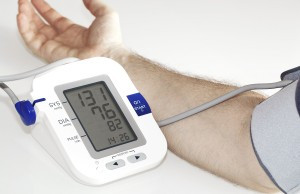
Trying to lose weight? Be careful not to lose muscle

Is your skin problem actually an autoimmune condition?

People with diabetes face higher risk of hearing loss

Antibiotic-free fixes for recurrent UTIs

Musculoskeletal syndrome of menopause: When menopause makes you ache all over

When can older women stop getting mammograms?

To lose weight, especially harmful belly fat, combine diet and exercise

Can men hold off on treating recurring prostate cancer?

The 7 types of rest and why we need them all

What are the early warning signs of cervical cancer?
Controlling Your Blood Pressure Archive
Articles
6 ways to eat less salt
DASH diet effective but not the only way to reduce sodium
Your body needs a little bit of salt every day for the sodium it contains. But too much sodium can boost blood pressure and stress the heart and blood vessels. The low-sodium Dietary Approaches to Stop Hypertension (DASH) diet is high in fruits, vegetables, and whole grains; moderately high in nuts and low-fat dairy products; and low in red and processed meats. Following it can lower blood pressure and reduce the risk of heart disease and stroke.
The DASH diet is a good way to eat healthy. But there's no need to follow that specific diet to get measurable results. If you want to tackle cutting back on sodium, try these six tips:
Monitoring your heart rhythm with a smartphone: A good call?
An app that detects an irregular heart rhythm could be reassuring for people worried about afib.
Image: Prykhodov /Thinkstock
Just over two years ago, the FDA approved the AliveCor Heart Monitor, which consists of a smartphone app plus a phone case with special sensors on the back. Touching the sensors with your fingers allows you to see a simple version of your heart's electrical activity on the phone screen. In the latest version, called Kardia, the sensors just need to be near (not necessarily on) your phone. The readout reveals if your heart rhythm looks normal or if you appear to have atrial fibrillation (afib)—a rapid, irregular heart rhythm that raises the risk of stroke.
Currently, several new smartphone apps to alert you about possible afib using just the phone itself—no special case required—are under development. Recent research suggests they're about as accurate as the Kardia system, although they haven't yet been cleared by the FDA and aren't on the market. If and when they are, could these apps help improve afib screening?
What is venous insufficiency?
Venous insufficiency, which happens when veins don’t work properly, can cause swelling, pain, and a sense of heaviness in the legs. Elevating the legs when sitting or lying down can help; so can support stockings.
Many older adults take unneeded blood pressure drugs
About 66% of adults over age 70 still take antihypertensive medication even though they now have low pressures, says a study from the University of Kent in the United Kingdom. Researchers say this exposes adults to medication side effects like dizziness and falls.
At-home testing for sleep apnea
Home sleep tests to diagnose obstructive sleep apnea (OSA) may reliably detect the disorder even if a sleep specialist is not involved. Marked by loud snoring and breathing lapses during sleep, OSA can increase the risk of cardiovascular disease.
How accurate are drugstore blood pressure machines?
An electronic home blood pressure monitor is a better option than a store-based machine for measuring blood pressure between doctor office visits. Arm cuff machines are more accurate than wrist cuff models.
Feel the beat
Your resting heart rate can be an instant measure of your present and future health.
Image: Bigstock
One of the easiest ways to gauge your health can be done in 30 seconds with two fingers. Measuring your resting heart rate (RHR), the number of heartbeats per minute while at rest, provides a real-time snapshot of your heart muscle function.
It is easy to do. Place your index and middle finger on your wrist just below the thumb, or on your neck to one side of your throat, so you can feel your pulse. Use a watch to count the number of beats for 30 seconds and double it to get your beats per minute. Repeat a few times to get an accurate reading. A normal RHR for most adults ranges from 60 to 100 beats per minute.
Risk of serious falls linked to changes in blood pressure drugs
When older people start taking a new blood pressure drug or change the dose of their current drug, they may be more prone to a serious fall during the following two weeks. But this increased fall risk doesn’t seem to persist over the long term.
What to do about a high blood pressure diagnosis
A high blood pressure diagnosis can come as a shock due to a lack of symptoms, but the condition is manageable. Dr. Naomi Fisher explains what to do after you are diagnosed.
How to determine— and achieve—your target blood pressure
Take an active role by checking your blood pressure with a home monitor.
Most appointments with a health care provider begin with a gentle squeeze—the sensation of a blood pressure cuff inflating around your upper arm. But that single blood pressure reading offers only a glimpse of the health of your cardiovascular system.
"When you have your blood pressure checked in the doctor's office, you're in an artificial environment that is not reflective of the vast majority of the time when your blood pressure is going through its daily excursions," says cardiologist Dr. Elliott Antman, professor of medicine at Harvard Medical School. Throughout the course of a day, the average person's systolic b-lood pressure (the first number in the reading) may fluctuate considerably.

Trying to lose weight? Be careful not to lose muscle

Is your skin problem actually an autoimmune condition?

People with diabetes face higher risk of hearing loss

Antibiotic-free fixes for recurrent UTIs

Musculoskeletal syndrome of menopause: When menopause makes you ache all over

When can older women stop getting mammograms?

To lose weight, especially harmful belly fat, combine diet and exercise

Can men hold off on treating recurring prostate cancer?

The 7 types of rest and why we need them all

What are the early warning signs of cervical cancer?
Free Healthbeat Signup
Get the latest in health news delivered to your inbox!
Sign Up








